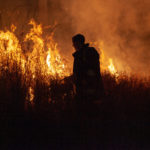Should Sniffer Dogs be Banned?

Those who regularly attend music festivals will be aware that sniffer dogs routinely patrol the events in an attempt to catch would-be drug users and suppliers.
Yet despite their presence, it seems that sniffer dogs do little to deter drug use, with upwards of 100 drug arrests being consistently made at Sydney music festivals.
Last week’s Future Music Festival, for example, saw police make a total of 177 drug arrests despite publicised warnings that there would be a heavy police and sniffer dog presence.
Perhaps most concerning was that three people were admitted to hospital following suspected drug overdoses at the event.
Overdoses at music festivals are not uncommon.
At Sydney’s Defqon 1 Festival in 2013, 23-year-old James Munro died after he panicked upon seeing sniffer dogs at the entrance and quickly swallowed three ecstasy pills.
And in 2009, 17-year-old Gemma Thoms passed away after swallowing three pills at Perth’s Big Day Out festival.
Her friend, Cassandra Southern, said that she had given Thoms the third pill because she feared that sniffer dogs would be present at the entrance to the event.
These tragic incidents have prompted calls for sniffer dogs to be banned from music festivals and other events, in a bid to deter patrons from popping multiple pills at a time; a practice known as ‘loading up’.
In recent times, prominent musicians have joined calls for sniffer dogs to be removed, saying that this will reduce the incidence of deadly overdoses.
Last week, Geoff Corbett, lead singer of Brisbane rock band SixFtHick, criticised the use of sniffer dogs at festivals, arguing that they do more harm than good.
Corbett drew on his experiences working in the mental health and drug and alcohol sectors, and suggested that increasing access to ‘pill reports’ – which enable drug users to look up the contents of pills – would be more beneficial than using sniffer dogs.
Corbett’s views are supported by Dan McNamee, who has played with electro band Art vs. Science at numerous big-name festivals including Splendour in the Grass.
McNamee made headlines last year after he penned a letter to Ballina MP Don Page asking him to trial a suspension of sniffer dogs at the 2014 Splendour in the Grass festival.
In his letter, McNamee detailed his first-hand experiences at music festivals, where he has witnessed numerous hospitalisations for drug overdoses.
He argued that the number of hospitalisations would drastically decrease if attendees were able to use drugs without fear of being charged for drug possession.
Despite his pleas, McNamee’s letter was effectively ignored by the MP, and sniffer dogs were present at the event, with police making a total of 159 drug-related arrests.
While the government is unlikely to change its approach anytime soon, a study conducted last year by the National Drug and Alcohol Research Centre presented evidence that the presence of sniffer dogs at events had a heavy influence on people’s risk-taking behaviour.
The study examined 500 festival attendees and found that 62% would take drugs regardless of whether or not sniffer dogs were present.
The study also found that the presence of sniffer dogs resulted in a 13% increase in the number of people who would consume drugs before entering a venue, rather than using them inside.
It also found that the presence of sniffer dogs resulted in a 40% increase in the use of ecstasy, methamphetamine and other ‘harder’ drugs over cannabis.
Dr Caitlin Hughes, who facilitated the study, says that this is due to the perception that the scent of cannabis is more likely to be picked up by sniffer dogs.
She backed calls for trials of alternative harm minimisation strategies.
Meanwhile, the NSW Greens have argued that sniffer dogs should be banned altogether because of high rates of false indications, after the group obtained government data which showed that no drugs were found in 61% of searches conducted by police after a drug dog indication.
And where drugs were found, the amounts were generally small.
We have published several blogs about the use of drug sniffer dogs, including a two-part blog series where we present the statistics for ‘false positives’, and argue that the mere fact that a sniffer dog gives a positive indication is not enough, by itself, for police to search a person; you can Click Here to read Part 1 and Here to read part 2.
Newtown Greens candidate Jenny Leong has promised to introduce a bill to get rid of sniffer dogs if elected in the upcoming state election.
The Greens have also criticised public searches as being humiliating and embarrassing.
They have expressed particular concerns about police over-using strip searches.
Strip searches are only meant to be carried out where police believe on ‘reasonable grounds’ that a search is necessary and the circumstances are ‘serious and urgent.’
But they are often conducted on festival attendees after a drug detection dog makes a positive indication.
Strip searches involve a person stripping down naked and standing in front of a mirror.
They are visual searches only, and police are not allowed to touch your body, search your body cavities or search your genital area without a court order.
Despite this, few would argue that being asked to strip down in front of a complete stranger is not a degrading experience.
At the end of the day, the concerns surrounding the use of drug sniffer dogs at both music festivals and generally should be taken into account when assessing the desirability and effectiveness of the current approach.






